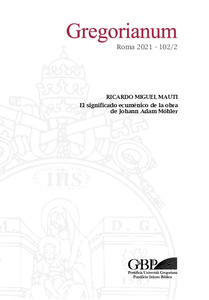Por favor, use este identificador para citar o enlazar este ítem:
https://repositorio.uca.edu.ar/handle/123456789/11558| Título: | El significado ecuménico de la obra de Johann Adam Möhler | Autor: | Mauti, Ricardo M. | Palabras clave: | Möhler, Johann Adam, 1796-1838; SIMBOLISMO; ECUMENISMO; DIALOGO; DATO BIOGRAFICO | Fecha de publicación: | 2021 | Editorial: | Editrice Pontificia Università Gregoriana | Cita: | Mauti, R. M. El significado ecuménico de la obra de Johann Adam Möhler [en línea]. Gregorianum. 2021, 102 (2). Disponible en: https://repositorio.uca.edu.ar/handle/123456789/11558 | Resumen: | Resumen:
El centésimo octogésimo aniversario de la muerte de Johann Adam Möhler (1838-
2018), ha sido la ocasión para profundizar la figura profética del que con justicia es
considerado precursor del moderno movimiento ecuménico. Desde el siglo XIX ha
sido considerado como reformador de la teología católica. Con sus obras La Unidad
de la Iglesia (1825) y Simbólica (1832) introdujo la investigación científica de las
diferencias doctrinales entre las confesiones en nombre de la Iglesia Católica. Contrariamente
a la práctica habitual en ese momento, Möhler evitó tanto la polémica como
el irenismo dogmático al describir la doctrina de las iglesias de reforma y se refirió
a sus propios documentos confesionales oficiales. Möhler contribuyó así a superar
las polémicas teológicas. Por lo tanto, es considerado como pionero e innovador de
la moderna teología ecuménica. El Concilio Vaticano II adoptó algunas de las ideas
importantes de Möhler. En el presente artículo abordaré desde tres aproximaciones
la figura de Möhler y su contribución al campo de la teología ecuménica. En primer
lugar, situaré al autor en el contexto de la Escuela católica de Tubinga (1), presentaré
sus dos obras cumbres (Die Einheit y Symbolik) en sus conceptos teológicos fundamentales
(2) mostraré su posteridad y recepción en orden a una renovada valoración
de su aporte ecuménico (3), finalizando con algunas conclusiones abiertas (4). Abstract: The hundredth and eightieth anniversary of the death of Johann Adam Möhler (1838-2018), has been the occasion to deepen the prophetic figure of whom is rightfully considered the precursor of the modern ecumenical movement. Since the 19th century he has been considered reformer of Catholic theology. With his works The Unity in the Church (1825) and Symbolism (1832) he introduced scientific research into the doctrinal differences between confessions on behalf of the Catholic Church. Contrary to standard practice at that time, Möhler avoided both controversy and dogmatic irenism in describing the doctrine of the reform churches and referred to his own official confessional documents. Möhler thus contributed to overcoming theological controversies. Therefore, he is regarded as a pioneer and innovator of modern ecumenical theology. The Second Vatican Council adopted some of Möhler’s important ideas. In this article I will address the issue from three approaches the figure of Möhler and his contribution to the field of ecumenical theology. In the first place, I will place the author in the context of the Tübingen Catholic School (1), I will present his two main works (Die Einheit and Symbolik) in their fundamental theological concepts (2) I will show his posterity and reception in order to a renewed assessment of his ecumenical contribution (3), ending with some open conclusions (4). |
URI: | https://repositorio.uca.edu.ar/handle/123456789/11558 | ISSN: | 0017-4114 | Disciplina: | TEOLOGIA | DOI: | 10.32060/Gregorianum.102/1.2021.289-310 | Derechos: | Acceso abierto | Fuente: | Gregorianum Vol.102, No.2, 2021 |
| Aparece en las colecciones: | Artículos |
Ficheros en este ítem:
| Fichero | Descripción | Tamaño | Formato | |
|---|---|---|---|---|
| significado-ecumenico-obra-mohler.pdf | 701,36 kB | Adobe PDF |  Visualizar/Abrir |
Visualizaciones de página(s)
215
comprobado en 27-abr-2024
Descarga(s)
269
comprobado en 27-abr-2024
Google ScholarTM
Ver en Google Scholar
Altmetric
Altmetric
Este ítem está sujeto a una Licencia Creative Commons

